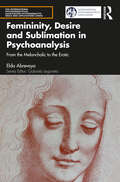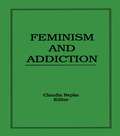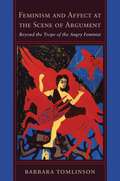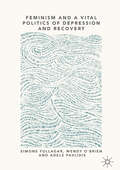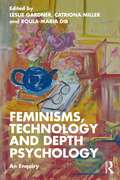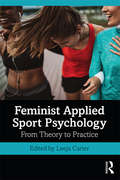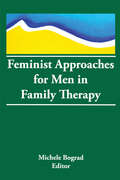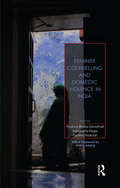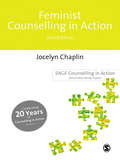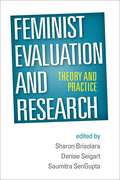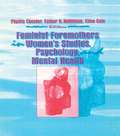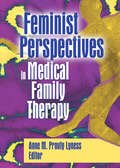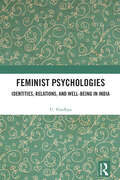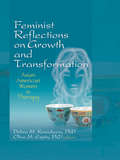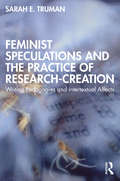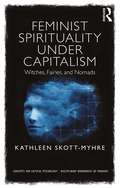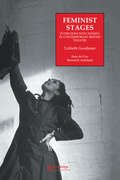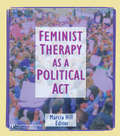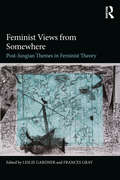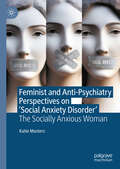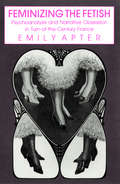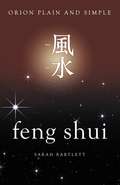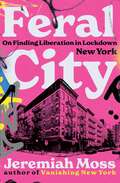- Table View
- List View
Femininity, Desire and Sublimation in Psychoanalysis: From the Melancholic to the Erotic (The International Psychoanalytical Association Psychoanalytic Ideas and Applications Series)
by Elda AbrevayaFemininity, Desire and Sublimation in Psychoanalysis explores female subjectivity and examines the complexities inherent in psychoanalytic work realized by women analysts with women. The book includes a critical study of psychoanalytic theories on femininity as well as a reflection on social aspects of gender. Elda Abrevaya envisages different paths to femininity, illustrated in the text with studies of Virginia Woolf and Marguerite Duras, and examines the vicissitudes of the relation of the little girl with the mother, and her crucial challenge, which is separation from the mother, in order to access erotic life and the use of cultural objects. Femininity, Desire and Sublimation in Psychoanalysis also explores the question of sublimation, shedding light on a field that has not been sufficiently explored in terms of female sexuality and female identity. Throughout the book, sublimation in women comes to the forefront as a source of satisfaction, liberation and participation in public life. The book will be important reading for psychoanalysts and other clinicians in the field of mental health as well as academics in the fields of gender studies, literature, philosophy and sociology.
Feminism and Addiction
by Claudia BepkoFeminism is a beneficial force in addictions therapy as they have the same goals--mending imbalances of power. A variety of important topics related to addictions treatment are addressed in this timely volume, accompanied by concrete clinical solutions for therapists and counselors to use in their own practice. Feminism and Addiction demonstrates the positive impact feminism can have on addictions treatment. Addictions treatment methods that have been developed primarily based on research with men are examined and questioned to determine what changes need to be made to meet the needs of women. The applicability of twelve-step treatment programs, for example, is investigated as to whether its required adoption of belief in powerlessness is concurrent with feminism’s battle with female subjugation. This thought-provoking volume contains the most current theoretical, social, and clinical issues enmeshed in the debates between men’s experiences and women’s experiences of addiction. Critical issues addressed include advice for how to deal with issues of codependency; how to treat clients faced with physical or sexual abuse in addition to addiction; how to integrate cultural differences into treatment; and how to face the particular difficulties of gay and lesbian clients in addictions treatment. This valuable book will help you apply constructivist approaches to build therapy methods which are collaborative, internal, and organic, thus more appropriate to treating women’s experience with addiction. Feminism and Addiction helps family therapists who work with women and their families strike a unique balance between the principles of feminism and family therapy’s goal of repairing and healing relationships between men and women.
Feminism and Affect at the Scene of Argument: Beyond the Trope of the Angry Feminist
by Barbara TomlinsonAre feminists really angry, unreasoning, man-haters who argue only from an emotional perspective as some claim? Does the incessant repetition of this trope make anti-feminism and misogyny a routine element in everyday speech? And does this repetition work towards delegitimizing feminist arguments and/or undermining feminist politics? How do skilled feminist writers deploy affect to advance feminist ideas? InFeminismand Affect at the Scene of Argument,Barbara Tomlinson addresses these questions, providing a lucid examination of the role of affect in feminist and antifeminist academic arguments. Using case studies from controversies in socio-legal studies, musicology, and science studies, among other disciplines, Tomlinson examines the rhetorics of anger, contempt, betrayal, intensification, and ridicule. She employs a set of critical tools—feminist “socio-forensic” discursive analysis—that will prove indispensible for understanding and countering tropes like that of the angry feminist. Moreover, these tools will advance feminism, which, she argues, is generated in and by arguments with allies and antagonists.
Feminism and a Vital Politics of Depression and Recovery
by Simone Fullagar Adele Pavlidis Wendy O’BrienDrawing upon insights from feminist new materialism the book traces the complex material-discursive processes through which women’s recovery from depression is enacted within a gendered biopolitics. Within the biomedical assemblage that connects mental health policy, service provision, research and everyday life, the gendered context of recovery remains little understood despite the recurrence and pervasiveness of depression. Rather than reducing experience to discrete biological, psychological or sociological categories, feminist thinking moves with the biopsychosocialities implicated in both distress and lively modes of becoming well. Using a post-qualitative approach, the book creatively re-presents how women ‘do’ recovery within and beyond the normalising imperatives of biomedical and psychotherapeutic practices. By pursuing the affective movement of self through depression this inquiry goes beyond individualised models to explore the enactment of multiple self-world relations. Reconfiguring depression and recovery as bodymind matters opens up a relational ontology concerned with the entanglement of gender inequities and mental (ill) health.
Feminism and the End of Traditional Religions
by Naomi R. GoldenbergGoldenberg asserts that Christianity and Judaism are patriarchal religions and it is impossible for women to achieve equality in these patriarchal religions. Through her examination of Jung and Freud, as well as modern religions such as Wicca, Goldenberg explores women's place in religion.
Feminisms, Technology and Depth Psychology: An Enquiry
by Leslie Gardner Roula-Maria Dib Catriona MillerFeminisms, Technology and Depth Psychology explores the intersection of a variety of feminist thought with technology through the lens of depth psychology, and investigates how current approaches to technology impact female life globally – from internet use, to biotechnology, to how female creators imagine life.This thought‑provoking collection is a discussion on changing female capacities and creativity. It questions whether female oppression is becoming more easily enabled within the context of technology use, touching on topics of manipulation, ecological awareness, female decision making, and more. Part One is a three‑chapter investigation on queer history, birthing, and reproductive technologies in science fiction novels. Part Two explores images of females and technology in a variety of cultural products ranging from science fiction films to contemporary TV dramas and novels. Part Three looks at the political impact of technology on female worlds, and Part Four examines perspectives on the creative process behind writing science fiction and fantasy. Feminisms, Technology and Depth Psychology will appeal to Jungian analysts and psychotherapists, and analytical psychologists. It also offers insightful perspectives to academics and students of psychology, gender studies, and politics.
Feminist Applied Sport Psychology: From Theory to Practice
by Leeja CarterWith an emphasis on women and transwomen athletes and exercisers of color, Feminist Applied Sport Psychology: From Theory to Practice introduces the reader to feminist, black feminist, and womanist sport psychology, offering an alternative and powerful approach to working with athletes. Covering core concepts, applied skills, and research methods, the book includes useful features throughout, such as discussion questions and definitions of key terms. It is organized into three sections covering, firstly, feminist theory, history, movements, and their importance in applied sport psychology; secondly, the intersection of race, class, and gender, and the integration of intersectional considerations into sport psychology; and finally, in-depth case studies of feminist sport psychology in action, each of which offers strategies for best practice. Feminist Applied Sport Psychology: From Theory to Practice is important reading for feminist-centred students and practitioners in performance and sports domains, and exercise psychology and anybody with an interest in feminist approaches to working with women of diverse backgrounds.
Feminist Approaches for Men in Family Therapy
by Michele BogradThis book is the first of its kind to address the treatment of men in marital and family therapy from a political or feminist perspective. Feminist Approaches for Men in Family Therapy is an important and provocative addition to the field of family therapy and psychotherapy and works to deepen the understanding of men by using more traditional approaches. Timely and relevant to today’s interest in men’s issues, this book develops and demonstrates applications of treatment methods in straightforward prose from a variety of family therapy models. These techniques and methods enable anyone working with men--beginning and advanced clinicians, regardless of clinical preference or loyalty--to have a more effective practice with men. Truly reflecting its title, this provocative volume offers new ways of conceptualizing male development and the dilemmas of men in therapy, while providing exemplars of the wide range of clinical work this perspective enriches. Chapters concisely summarize the major benefits and limitations of conventional approaches to treating men and provide beginning conceptualizations of treatment issues with men that are grounded in social theory, sensitivity to power issues and the social context, and shifting cultural definitions of masculinity, femininity, and the nature of marriage. Other chapters employ the exciting and germane concepts of social constructionism to analyze belief systems about men and how cultural ideals shape and limit the personal development of men. An ideal resource for all therapists striving for excellence in treating men.
Feminist Counselling and Domestic Violence in India
by Padma Bhate-Deosthali; Sangeeta Rege; Padma PrakashMainstream counselling in domestic violence often fails to address critical issues, such as gender socialisation processes and the abuse of power that allows violence against women, and focuses primarily on the intra-psychic nature of individual women. In contrast, feminist counselling is an effective alternative model, owing to its ability to address the fundamental correlation of abuse with power. In going beyond the individual, it helps women locate the source of their distress in the larger social context of power and control, manifesting in intimate, interpersonal relationships, and enables them to resist systemic oppression.This volume offers one of the first systematic documentations of feminist psychosocial interventions in India. It situates the issue of domestic violence in the historical context of the women’s movement, and examines institutional factors such as family and marriage that perpetuate abuse. Using extensive case studies, it discusses the methods, principles, techniques, skills and procedures followed by feminist organisations across the country, and their role in women’s empowerment. The book will serve as a practical reference guide to practitioners such as social workers, counsellors and para-counsellors, health activists, grassroots workers, protection officers and service providers. It will also be useful to scholars and students of psychology, sociology, women’s studies, law and public policy.
Feminist Counselling in Action (Counselling in Action #Vol. 1)
by Jocelyn ChaplinFor counsellors, therapists, trainees and others who want a deeper understanding of how society affects them psychologically, the revised and updated edition of Feminist Counselling in Action is the ideal resource. Drawing on feminist theory, Jocelyn Chaplin points to the deeply entrenched, hierarchical ways of thinking which permeate every level of our lives. The author presents an alternative rhythm model that when applied in counselling increases self-confidence, `wholeness' and improved relationships. In this model, the counsellor is not seen as the expert or the doctor, and the client is not a patient. They are two equal but different people using `clues' to understand and improve the life of the client. To illustrate, the author includes vivid case examples throughout.
Feminist Evaluation and Research
by Saumitra Sengupta Denise Seigart Sharon BrisolaraThis thought-provoking book explores the 'whats,' 'whys,' and 'hows' of integrating feminist theory and methods into applied research and evaluation practice. Illustrative cases drawn from U.S. and international studies address a range of social and health issues. The book provides an overview of feminist theory and research strategies as well as detailed discussions of how to use a feminist lens, practical steps and challenges in implementation, and what feminist methods contribute to research and evaluation projects. Reflections at the close of each section invite the reader to consider key questions and common themes across the chapters. With a focus on social justice models, the book covers ways to conduct feminist research and evaluation in effective, innovative, and culturally competent ways in diverse social and cultural contexts.
Feminist Foremothers in Women's Studies, Psychology, and Mental Health
by Phyllis Chesler Ellen Cole Esther D RothblumFeminist Foremothers in Women’s Studies, Psychology, and Mental Health is by and about the more recent wave of feminist foremothers; those who were awakened in the 1960s and ’70s to the realization that something was terribly wrong. These are the women who created the fields of feminist therapy, feminist psychology, and women’s mental health as they exist today. The 48 women share their life stories in the hope that they will inspire and encourage readers to take their own risks and their own journeys to the outer edges of human possibility. Authors write about what led up to their achievements, what their accomplishments were, and how their lives were consequently changed. They describe their personal stages of development in becoming feminists, from unawareness to activism to action. Some women focus on the painful barriers to success, fame, and social change; others focus on the surprise they experience at how well they, and the women’s movement, have done. Some well-known feminist foremothers featured include: Phyllis Chesler Gloria Steinem Kate Millett Starhawk Judy Chicago Zsuszanna Emese Budapest Andrea Dworkin Jean Baker Miller Carol Gilligan In Feminist Foremothers in Women’s Studies, Psychology, and Mental Health, many of the women see in hindsight how prior projects and ideas and even dreams were the forerunners to their most important work. They note the importance of sisterhood and the presence of other women and the loneliness and isolation experienced when they don’t exist. They note the validation they have received from grassroots feminists in contrast to disbelief from professionals. Although these women have been and continue to be looked up to as foremothers, they realize how little recognition they’ve been given from society-at-large and how much better off their male counterparts are. Some foremothers write about the feeling of being different, not meshing with the culture of the time and about challenging the system as an outsider, not an insider. These are women who had few mentors, who had to forge their own way, “hit the ground running.” Their stories will challenge readers to press on, to continue the work these foremothers so courageously started.Throughout the pages of Feminist Foremothers in Women’s Studies, Psychology, and Mental Health runs a sense of excitement and vibrancy of lives lived well, of being there during the early years of the women’s movement, of making sacrifices, of taking risks and living to see enormous changes result. Throughout these pages, too, sounds a call not to take these changes for granted but to recognize that feminists, rather than arguing over picayune issues or splitting politically correct hairs, are battling for the very soul of the world.
Feminist Perspectives in Medical Family Therapy
by Anne M. Prouty LynessReinforce the relationship between healthy bodies and healthy relationships in families! Feminist Perspectives in Medical Family Therapy explores the groundbreaking collaboration of therapy and medicine to form a biopsychosocial approach to health care. In this book, feminists from several fields of study offer their ideas, research, and personal experiences to show how gender, culture, and other diversity issues affect medical treatment. This invaluable tool provides tips and suggestions for interdisciplinary medical teams working with patients&’ bodies, minds, spirits, and relationships simultaneously. Medical family therapy is a relatively new specialty, and this book demonstrates its advantages and opportunities with an easy-to-understand, applicable approach. Clinicians, researchers, trainers, and students in medicine, social work, family therapy, psychology, and others can use Feminist Perspectives in Medical Family Therapy to examine more closely the medical issues that are most relevant to women and families. In this unique resource, you&’ll learn about: how both biological factors and environment create gender differences-and how they apply to women with depression how the issues of power and gender influence the experiences of male and female medical family therapists incorporating feminist principles in family medicine education the benefits of collaborative care to both physicians and patients in a family medicine setting using couples therapy in cases of vulvar vestibulitis syndrome how a woman&’s diagnosis of cancer affects the family system Feminist Perspectives in Medical Family Therapy offers a variety of viewpoints from patients and providers, using hard data, interviews, practicum models, case examples, and reflections on personal experiences.
Feminist Psychologies: Identities, Relations, and Well-Being in India
by U. VindhyaThis book aims to be a comprehensive resource that will apprise readers of the complex dynamics of the psychological interiors of women and others in the sex and gender spectrum, as they grapple with sociopolitical and cultural constraints. Going beyond the ambit of mainstream psychology, this volume draws from interdisciplinary fields of women’s/gender studies to highlight power imbalances, their intersectional nature, and the ways in which they shape the psychology of gender relations. The book illuminates three focal themes of identities, well-being, and relations, which illustrate the psychological, contextualised in the backdrop of social, political, and cultural developments in contemporary India. The first theme explores the building of identities in the changing dynamics of work–family interfaces, non-normative sexualities, and genders and the intersections of caste, gender, and social hierarchies. The second theme focuses on the gendering of mental health, including the intervention of feminist counselling. The third theme highlights conceptualisations and practices of masculinities and the role of agency, empowerment, and collective action in the pathways to equitable gender relations and social transformation. This book will be of interest to students, teachers, researchers of psychology, and of women’s/gender studies. It will also be useful for anyone who is interested to learn about recent psychological scholarship in India, informed and imbued with a feminist perspective on women as well as other genders.
Feminist Reflections on Growth and Transformation: Asian American Women in Therapy
by Debra M. Kawahara and Oliva M. EspínUnderstanding multicultural feminist perspectives is vital for clinicians working to effectively help women in therapy. Feminist Reflections on Growth and Transformation: Asian American Women in Therapy provides therapists with valuable insight and research into the identities of Asian and Asian American women, all toward the crucial goal of being more effective when providing therapeutic help. In-depth explorations into the women’s personal experiences and psychological issues provide an empowering multicultural feminist viewpoint that challenges assumptions and stereotypes about their identities while presenting innovative therapeutic approaches.Identity is made up from several factors, such as worldview, beliefs, values, race, ethnicity, gender, sexual orientation, class, age, and religious orientation. Feminist Reflections on Growth and Transformation: Asian American Women in Therapy explores how these common factors impact psychotherapy approaches for women of Asian American backgrounds. This unique text presents the current research, what the data mean for adjusting clinical strategies, and personal accounts from Asian and Asian American women. Each chapter is extensively referenced.Topics in Feminist Reflections on Growth and Transformation: Asian American Women in Therapy include: breaking free of the passive, subservient stereotypes defining gender identity cultural and identity issues emotional parity negotiations in Chinese immigrant women’s marital relationships suicide as a means of agency rather than simply a cry for help the use of feminist and multicultural principles with survivors of domestic violence research on Asian American lesbians’ health integrating multiculturalism and feminism in the treatment of eating disorders innovative therapeutic approach based on Hindu understandings of Shakti approaches to work on body image and eating disorders group counseling with Asian American women training multicultural feminist therapy practitionersFeminist Reflections on Growth and Transformation: Asian American Women in Therapy is an insightful exploration of the culturally sensitive knowledge and skills clinicians need to work more effectively with female clients of Asian ancestry. This stimulating work is important reading for therapists, counselors, psychologists, and others in the mental health and social work fields.
Feminist Speculations and the Practice of Research-Creation: Writing Pedagogies and Intertextual Affects
by Sarah E. TrumanFeminist Speculations and the Practice of Research-Creation provides a unique introduction to research-creation as a methodology, and a series of exemplifications of research-creation projects in practice with a range of participants including secondary school students, artists, and academics. In conversation with leading scholars in the field, the book outlines research-creation as transdisciplinary praxis embedded in queer-feminist anti-racist politics. It provides a methodological overview of how the author approaches research-creation projects at the intersection of literary arts, textuality, artistic practice, and pedagogies of writing, drawing on concepts related to the feminist materialisms, including speculative thought, affect theories, queer theory, and process philosophy. Further, it troubles representationalism in qualitative research in the arts. The book demonstrates how research-creation operates through the making of or curating of art or cultural productions as an integral part of the research process. The exemplification chapters engage with the author’s research-creation events with diverse participants all focused on text-based artistic projects including narratives, inter-textual marginalia art, postcards, songs, and computer-generated scripts. The book is aimed at graduate students and early career researchers who mobilize the literary arts, theory, and research in transdisciplinary settings.
Feminist Speculations and the Practice of Research-Creation: Writing Pedagogies and Intertextual Affects
by Sarah E. TrumanFeminist Speculations and the Practice of Research-Creation provides a unique introduction to research-creation as a methodology, and a series of exemplifications of research-creation projects in practice with a range of participants including secondary school students, artists, and academics.In conversation with leading scholars in the field, the book outlines research-creation as transdisciplinary praxis embedded in queer-feminist anti-racist politics. It provides a methodological overview of how the author approaches research-creation projects at the intersection of literary arts, textuality, artistic practice, and pedagogies of writing, drawing on concepts related to the feminist materialisms, including speculative thought, affect theories, queer theory, and process philosophy. Further, it troubles representationalism in qualitative research in the arts. The book demonstrates how research-creation operates through the making of or curating of art or cultural productions as an integral part of the research process. The exemplification chapters engage with the author’s research-creation events with diverse participants all focused on text-based artistic projects including narratives, inter-textual marginalia art, postcards, songs, and computer-generated scripts.The book is aimed at graduate students and early career researchers who mobilize the literary arts, theory, and research in transdisciplinary settings.
Feminist Spirituality under Capitalism: Witches, Fairies, and Nomads
by Kathleen Skott-MyhreIndustrial modernity's worship of rationality had a profound effect on women’s ways of knowing, marginalizing them along with other alternate forms of knowledge such as the imagination and the unconscious. Feminist Spirituality under Capitalism discusses the importance of women’s spiritual knowledge throughout history and under the current socio-economic consensus. Within a critical analysis of the subjugation of certain knowledges, it investigates in particular the role that psychology and psychiatry have played in the repression of women. Aimed at students and researchers in the social sciences, the book will also appeal to anyone interested in critical psychology, politics, activism and social change.
Feminist Stages: Interviews with Women in Contemporary British Theatre (Contemporary Theatre Studies #Vol. 1)
by Lizbeth Goodman Jane de GayThis volume is a collection of interviews that spans feminist views from 1968 to the 1990s. Including over eight years of research. Part of the Comtemporary Theatre Studies series, it will be of special interest to everyone involved in theatre and useful to students and those who oare interested in women's theatre.
Feminist Therapy as a Political Act
by Marcia HillFeminist Therapy as a Political Act explores what is means to politicize therapy and how you can make pyschotherapy a method for creating social and individual change. You’ll find examples and strategies for discussing topics such as empowerment and identity that allow you to provide better services to clients while learning new ideas and methods of feminist therapy. Examining how language, behavior, and political thinking influence therapeutic methods, Feminist Therapy as a Political Act contains suggestions and examples that can be applied to clients in the individual, hospital, or community setting. You’ll discover the rich variety of ways in which therapists politicize the therapy relationship, setting, assumptions, techniques, and dialogues, and find several examples on how to incorporate political consciousness into your sessions. Feminist Therapy as a Political Act gives you insight into several methods and practices, including: integrating specific therapy techniques and the background dialogue of therapy into principles of feminist therapy practices modifying cognitive-behavioral therapy, hypnosis, and other therapy techniques to make them more compatible with feminist principles redefining and reclaiming empowerment for conducting political analysis in feminist psychotherapy recognizing client identity, including race, gender, and sexual identity, to provide clients with better therapy providing information on Japanese feminist counseling in relation to Eastern thought, the women’s liberation movement, and the concepts of independence, dependence, and maternity discussing the challenges of working with menContributors to Feminist Therapy as a Political Act give you insight into the profession on the international level, for example, examining the challenges to feminist therapists in Japan and describing how survivors of incest and sexual abuse in Israel “went public” with their ordeals through art, poetry, performances, and lectures. Offering diverse methods, techniques, and suggestions that will help you provide better services for your clients, Feminist Therapy as a Political Act also gives you the knowledge and inspiration to make your therapeutic work a political act.
Feminist Views from Somewhere: Post-Jungian themes in feminist theory
by Frances Gray Leslie GardnerFeminist Views from Somewhere: Post-Jungian Themes in Feminist Theory explores what and how Jungian thought contributes to feminist thinking. Broadly speaking, feminist thinking, or thinking by and about women as autonomous, intelligent and independent agents, has opened up scholarship through insightful, reflective critique and practice. This is the starting point of this collection from a range of theorists, interested in the multiple concerns of Jungian and analytical psychology. The contributors take a unique approach to Jungian thinking. Rather than focusing on its mythological aspects, the authors develop alternative, feminist approaches that enhance the appreciation of the possibilities for Jungian and post-Jungian studies. With a primarily theoretical orientation, the rigorous, critical approaches in the collection highlight the possibilities of imaginative Jungian theory. Divided into three parts, ‘Viewing Earth’, ‘Clinical Perspectives’ and ‘Literary Landscapes’, the chapters cover themes including embodiment, intersubjectivity, individuation and narrative. The contributors vividly reflect the range and diversity of opinions amongst women influenced by Jungian thought. Feminist Views from Somewhere is essential reading for academics and students of Jungian and post-Jungian studies, women’s studies and gender studies, as well as analytical psychologists in practice and in training.
Feminist and Anti-Psychiatry Perspectives on ‘Social Anxiety Disorder’: The Socially Anxious Woman
by Katie MastersThis book conceptualises the diagnosis ‘Social Anxiety Disorder’ (SAD) in women as a rational response to life in postfeminist, neoliberal, twenty-first century Britain. By speaking to women with this diagnosis, and drawing on the author’s lived experience, it investigates the interplay between women’s social anxiety and Western culture. It argues that societal factors are implicated in women’s mental distress to a far greater extent than dominant (especially psychiatric) narratives would hold—narratives which, premised on individual pathology, often present a biologically reductionist and medicalised account. Through deploying a unique blend of feminism and anti-psychiatry, this book critiques the framework which exists around diagnosing and treating SAD, but without dismissing distress. Inspired by feminist critiques of other gendered psychiatric diagnoses, such as Anorexia Nervosa, it conceptualises ‘SAD’ in women as a ‘culture-bound syndrome’. This book will interest students and scholars of gender studies and sociology.
Feminizing the Fetish: Psychoanalysis and Narrative Obsession in Turn-of-the Century France
by Emily ApterShoes, gloves, umbrellas, cigars that are not just objects—the topic of fetishism seems both bizarre and inevitable. In this venturesome and provocative book, Emily Apter offers a fresh account of the complex relationship between representation and sexual obsession in turn-of-the-century French culture. Analyzing works by authors in the naturalist and realist traditions as well as making use of documents from a contemporary medical archive, she considers fetishism as a cultural artifact and as a subgenre of realist fiction. Apter traces the web of connections among fin-de-siècle representations of perversion, the fiction of pathology, and the literary case history. She explores in particular the theme of "female fetishism" in the context of the feminine culture of mourning, collecting, and dressing.
Feng Shui, Orion Plain and Simple (Plain and Simple)
by Sarah BartlettA practical guide to the art of feng shui.Filled with easy-to-use tips and techniques for improving the energy in your life, this book will teach you to harmonize and lay out spaces in your home to enhance your personal energy, improve your overall wellbeing, and bring good fortune and balance into your life.Includes information on how to:Declutter to clear the energy in your homeUse the Chinese bagua (number square) to map out rooms to enhance energyEmploy the five elements to harmonize the energy of your homeUse feng shui for the exterior of your home and outside landscapingThis wonderful primer will be hailed by anyone interested in interior design, Chinese legend and lore, and the creation of healing and harmonious living spaces.
Feral City: On Finding Liberation In Lockdown New York
by Jeremiah MossWhat happens when an entire social class abandons a metropolis? This genre-bending journey through lockdown New York offers an exhilarating, intimate look at a city returned to its rebellious spirit. The pandemic lockdown of 2020 launched an unprecedented urban experiment. Traffic disappeared from the streets. Times Square fell silent. And half a million residents fled the most crowded city in America. In this innovative and thrilling book, author and social critic Jeremiah Moss, hailed as “New York City’s career elegist” (New York Times), explores a city emptied of the dominant class—and their controlling influence. “Plagues have a disinhibiting effect,” Moss writes. “As the normal order is suspended, the repressive force of civilization lifts and our rules fall away, shifting the boundaries of society and psyche.” In public spaces made vibrant by New Yorkers left behind, Moss experienced an uncanny time warp. Biking through deserted Manhattan, he encountered the hustlers, eccentrics, and renegades who had been pressed into silence and invisibility by an oppressive, normative gentrification, now reemerging to reclaim the city. For one wild year the streets belonged to wandering nudists and wheelie bikers, mystical vagabonds and performance artists working to disrupt the status quo, passionate activists protesting for Black lives—along with the everyday New Yorkers who had been pushed to the margins for too long. Participating in a historic explosion of activism, resistance, and spontaneity, from queer BLM marches to exuberant outdoor dance parties, Moss discovered an intoxicating freedom. Without “hyper-normal” people to constrain it, New York became more creative, connected, humane, and joyful than it had been in years. Moss braids this captivating narrative with an account of his renewed sense of place as a transgender man, weaving together insights from psychoanalysis, literature, and queer theory. A kaleidoscopic vision of a city transformed, Feral City offers valuable insight into the way public space and the spaces inside us are controlled and can be set free.
